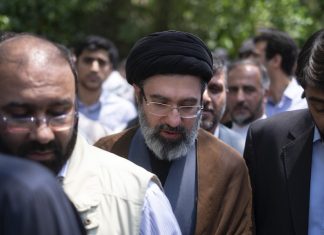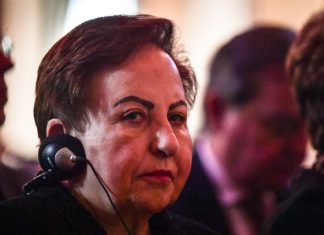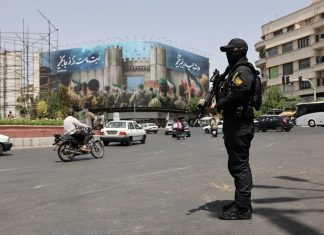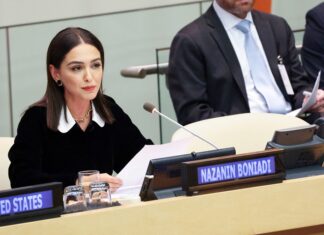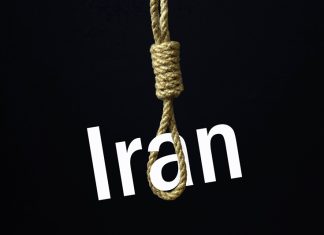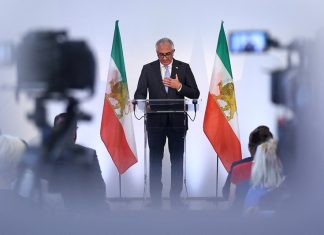[aesop_image img=”https://kayhanlife.com/wp-content/uploads/2022/04/2021-02-12T195130Z_1049192511_RC27RL99SF22_RTRMADP_3_VENEZUELA-SANCTIONS-scaled.jpg” panorama=”off” credit=”REUTERS/Manaure Quintero” align=”center” lightbox=”on” captionsrc=”custom” caption=”UN Special Rapporteur on Negative Impact of Unilateral Coercive Measures on Human Rights, Alena Douhan, takes part in a news conference in Caracas, Venezuela February 12, 2021. ” captionposition=”left” revealfx=”off” overlay_revealfx=”off”]
Ebadi said she was a “human rights defender” with the interests of the people of Iran in mind during an April 22 BBC interview. “When I face the government’s trickery, I have to shout that bringing in a sanctions rapporteur is in fact the trick of the Iranian government,” she added.
Iran is straining under an increasing number of US sanctions which stem from concerns that the regime’s nuclear program and its support of militia groups in the Middle East pose a global security threat. Iran’s government has called the sanctions “malicious” and an act of “ill will.”
Ebadi, a former judge, has written to Michelle Bachelet, the UN High Commissioner for Human Rights, calling for the visit by Douhan to be postponed until Iran also allowed Javaid Rehman — the UN Special Rapporteur on human rights in Iran — to visit the country.
In her April 22 letter, Ebadi has asked that both rapporteurs visit together to provide “a complete view” of the situation in Iran. She said while the Iranian government wanted to demonstrate that the country’s rising poverty was down to sanctions, “the systematic corruption in Iran and wide-reaching embezzlements, as well as the government’s bad policy decisions over the past forty years, cannot be overlooked.”
Rehman has issued scathing reports on the Iranian government’s human rights record and has called for an independent inquiry into the 1988 executions of thousands of political prisoners in Iran. Tehran has called the rapporteur’s reports “biased” and “devoid of any legal validity.” Rehman has not been allowed into Iran.
EXCLUSIVE – U.N. Expert Backs Probe into Iran’s 1988 Killings, Raisi’s Role
Human rights groups are also concerned about Douhan’s visit. Shiva Mahbobi, a London-based human rights defender and spokesperson for the Campaign to Free Political Prisoners in Iran (CFPPI), told Kayhan Life that Douhan’s findings could embolden the Iranian regime.
“This visit will only give the regime legitimacy. It also ignores the fact that the regime has been suppressing, imprisoning and torturing people for demanding their basic rights, and this has nothing to do with the sanctions,” Mahbobi said. “The regime is the main cause of poverty, and their leaders and the IRGC [Islamic Revolutionary Guards Corps] have been accumulating wealth under sanctions while people are living below the poverty line.”
In an April 26 letter, the CFPPI urged the office of the UN high commissioner for human rights to extend Douhan’s mission.
“Will Ms. Alena Douhan demand an explanation about all brutal and violent crackdowns of demonstrations, and demand the immediate release of all political prisoners in Iran?” The letter asked.
SPECIAL REPORT- Iran’s Leader Ordered Crackdown on Unrest: “Do Whatever It Takes to End It”
IRGC Officer Tells Tribunal of Khamenei’s Alleged Role in Suppressing 2019 Protests
The letter also demanded that any visit by a UN special rapporteur should include an unsupervised visit to inspect the country’s prisons and to speak freely with political prisoners and their families.
Douhan’s role involves assessing the impact of sanctions on a country’s ability to uphold its human rights obligations, which consist of: social; economic; cultural; and civil rights. Her brief does not include looking at the state of human rights in Iran as a whole.
In a previous report filed about US sanctions on Venezuela, Douhan said the sanctions had created a risk-averse atmosphere which made access to humanitarian aid lengthy and inefficient. She said the sanctions in the country had caused critical shortages of food; water; electricity; and gas and that the cumulative effects were “enormous.”
Experts say the Islamic Republic’s ongoing economic crisis has been caused by a combination of factors including widespread government corruption; fiscal mismanagement; and sanctions.
Iran Energy Workers Hold Wage Protests as Economy Hit by Economic Mismanagement, Sanctions
ANALYSIS: UN Urged to Address Iran’s Human Rights Violations

